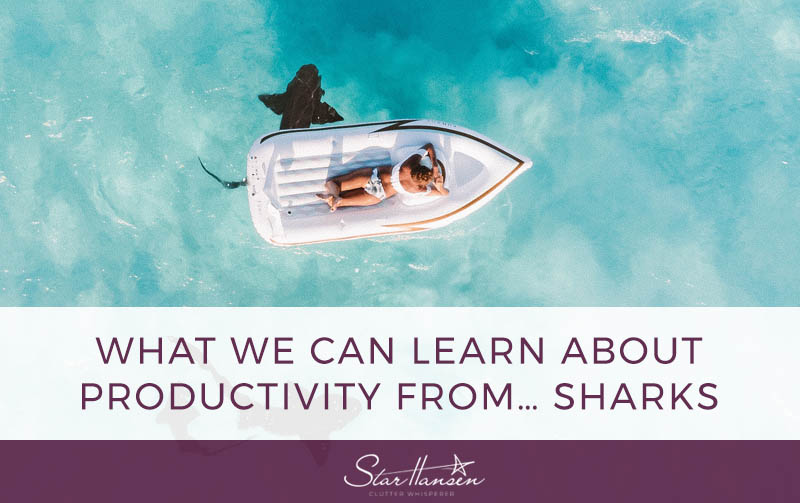What We Can Learn About Productivity from… Sharks, Did you know? We can learn everything we need to know about productivity… wait for it… sharks. That’s right, sharks. Growing up, I was terrified of these underwater lurkers. It’s actually a thing, fear of sharks. It’s called Galeophobia: an abounding, persistent fear of sharks–and it causes true anxiety, even when no sharky threats pose any harm.
I was a competitive swimmer during my teens and I always swam quickly.
I envisioned a huge shark behind me, ready to swallow me with one deadly gulp! I allowed this fear to run the show. I remember watching Jaws with horror. It was so terrifying, and yet I couldn’t look away–which only magnified my fear. Shark Week, Shark Tank–you name it. If there was any sort of discussion about sharks, I was running in the other direction. Eventually, I was too scared to even swim in a swimming pool.
A number of years ago I was so tired of living in fear that I started doing research in the hopes of overcoming my Galeophobia. I read books and watched documentaries about sharks and the ocean, and through this process, I found myself strangely inspired by sharks. They aren’t the flesh-eating monsters the movies portray them to be at all. Well, technically they do eat flesh, but so do cats, and we seem to have no problem curling up with them at night. I’m not saying we should cuddle sharks, but what I’ve learned about these fascinating ocean creatures makes me more inclined to view them through another lens entirely.
Take productivity, for example. There are 1,000,001 apps that promise to help us remember all our to-dos and be more productive at work, more efficient at time management and smarter at scheduling our lives in general. But sharks have productivity down pat. They don’t waste their time with anything that doesn’t pay off.
Factoid #1–Sharks Bite to Explore
Shark’s mouths are like high-powered computers. They are sensory organs with pressure-sensitive jaws and teeth. With one bite, a shark can determine whether or not what they’ve bitten is even worth the energy they would have to expend to eat it. This is why when sharks bite humans, they don’t often eat us because our bony little bodies are just not worth their efforts. Most sharks bite humans because they are either curious (and only have the use of their mouths to explore), or it’s a case of mistaken identity and they think we are a seal or another animal of prey.
Lesson #1
We might consider treating our tasks and activities in the same way that sharks explore. If the task at hand doesn’t serve your main priorities and current focus areas, don’t waste your time.
Factoid #2–Different Strokes for Different… Sharks
Sharks keep the ocean clean. They “tidy” as they move (er, eat their way) through the world.
Although most sharks are carnivorous, different types of sharks consume their prey using vastly different methods. For example, whale and megamouth sharks filter feed plankton, while some seabed dwelling species ambush prey or even use camouflage to lie in wait before sucking unsuspecting prey into their mouths. Some sharks eat a diet solely consisting of crustaceans that they crush with hard, flat teeth, and still others like the whitetip reef shark are social hunters, herding and capturing their prey by way of packs.
Sort of like there are different decluttering tools and methods depending on your personality type, right? Okay, a bit of a stretch, but you get the picture.
Lesson #2
I vote for less clutter and more living. Sharks can help inspire us to better manage our clutter using different tools as we move through life.
Factoid #3–Sharks are Survivors
Sharks are over 400 million years old. That’s 100 million years older than dinosaurs. Sharks survived the asteroid that wiped out the dinosaurs and the ice age. They are strong, powerful, masters of evolution and perfectly at balance. If sharks didn’t exist, the species below them in the food chain would grow out of control and decimate other populations–eventually throwing the whole ecosystem out of whack.
Lesson #3
By managing the tasks that align with our priorities, we naturally calibrate our own personal ecosystems. The rest is a simple domino effect. Where we find balance with time management, we find balance at work. And where we find balance at work, often personal issues resolve at home–ultimately leading to greater happiness.
Call of the Wild, Call for Creativity
As strong and as powerful as they are, sharks are in trouble. In the last 40 years of their 400-million-year existence, the world’s shark population has been reduced by 90%. The truth is that if you see a shark when you’re out in the ocean, it’s incredibly rare, and you might look upon it as though it were a magical unicorn you may never see again.
Don’t take my word for it. Find out for yourself what you can embrace about sharks (like other creative productivity hacks). Sharks aren’t evil; they’re just misunderstood. And as long as we see them as monsters to be feared, we’re going to feel justified in standing by and allowing them to be killed to the point of extinction.
Through my research on sharks, I conquered my fear and found love instead. Recently I went scuba diving in the ocean for the first time. I encountered every imaginable sea creature. It was absolutely breathtaking, and I want more. More fish, more otter, more coral, more plankton and yes, more sharks!
In my line of work, inspiration is everywhere, even in the strangest of places. I challenge you to look beyond what’s right in front of you this week to tap into your inner genius. Look beyond your keyboard, your apps, and your lists and lists of to-dos. I can promise you that when you do, you’ll find that creativity is right around the bend.






as we lazed away at the beach. But the highlight for me was swimming and snorkeling with these magnificent spotted leopard sharks–a huge bucket list item. When I finally said my goodbyes, it was time to really sink into the […]